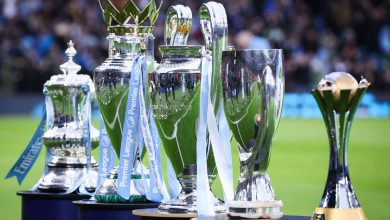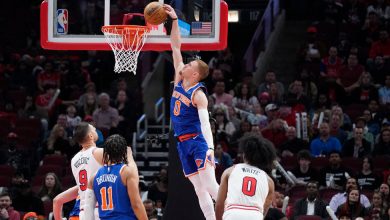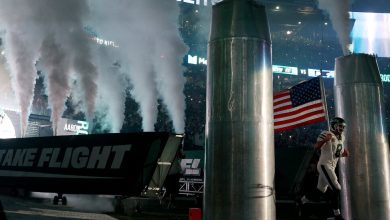Mr. Real Madrid

MADRID — Florentino Pérez strode onto the television set looking somber. Though he knew his questioner would be a little more informal — open-necked shirt, blazer — the Real Madrid president had chosen a straightforward black suit for the occasion. He even wore a tie. This was business, not pleasure, serious, not trivial, and Pérez wanted to project that.
On the screens behind him, a lurid orange logo depicted a cartoon soccer ball with flames jetting out of its rotating crown.
In England, in Italy and particularly in the United States, an assortment of financiers, tycoons and magnates of various stripes — all of them, like Pérez, among the dozen founding members of what would come to be known as the Super League — watched along in horror.
The 12 clubs had struggled, in the weeks before going public, to find someone to act as the frontman for their idea. It was a complex, delicate project, one that needed careful presentation. But while none of the American owners of England’s most illustrious teams wanted to take center stage, nor did they believe Pérez, the architect of much of the idea, would come across as authoritative, weighty, persuasive.
Pérez might occupy an almost unrivaled position of power at home — president of Real Madrid, chairman of one of the world’s largest construction firms, his box at the Santiago Bernabéu a magnet for the great and the good — but abroad he was often seen as bombastic, hubristic, faintly ridiculous. His appearance on “El Chiringuito” — a late-night, low-rent talk show — seemed to confirm his partners’ fears.
Within days, the entire project collapsed. And then, only a little more than 12 months later, it all happened again.
For four years, Pérez had been trumpeting the idea that Real Madrid would sign Kylian Mbappé, doing everything he could to court the French striker, a boyhood Real fan. The club had squirreled away a considerable portion of its transfer income for Mbappé’s signing-on fee and his salary, and as recently as March, Pérez was making not especially cryptic remarks to the news media suggesting an agreement was imminent.
Then, late last week, Mbappé messaged Pérez to thank him for his offer, and inform him that he had chosen to stay at Paris St.-Germain. Pérez had just enough time to alert his team to Mbappé’s change of heart before the 23-year-old Frenchman appeared on the field at the Parc des Princes to celebrate his new three-year contract.
Ordinarily, at a club as proud and demanding as Real Madrid, those twin embarrassments would be enough to spark some sense of mutiny. Pérez, though, remains as powerful, as unassailable as ever.
In part, of course, that can be attributed to the one aspect of the club not under his direct control. Pérez, ultimately, stands or falls on the fortunes of the team. Despite only cosmetic changes to the squad last summer — the additions of Eduardo Camavinga, a young midfielder; the versatile David Alaba; and the reinstatement of Carlo Ancelotti as coach — this has proved, a touch unexpectedly, to be a vintage season for Real Madrid.
A team beaten to the Spanish title last season by its in-city rival, Atlético, has been restored — with ease — to its domestic perch. A team that had been knocked out of the Champions League with little fuss by Ajax, Manchester City and Chelsea in the last three years has returned, imperiously, to the final. Only Liverpool, on Saturday in Paris, stands between Real Madrid and a record 14th European Cup.
In Karim Benzema, the last man standing from that first wave of signings that heralded Pérez’s return to the Real Madrid presidency in 2009, the club may possess the world’s standout player. In the likes of Vinicius Junior, Camavinga and Rodrygo, there are the green shoots of a new generation starting to sprout. Pérez has overseen it all while reconstructing the Bernabéu, turning it into a slick, state-of-the-art venue, complete with extensive corporate areas and a retractable turf field.
But Pérez, 75, is not as vulnerable to the vicissitudes of form and fate as might be expected of a democratically elected president. Real Madrid is owned by its members, after all, but increasingly it feels like Pérez’s personal kingdom.
Last summer, one of the few figures at the club who served as a counterweight to Pérez, the Galáctico player turned Galáctico coach Zinedine Zidane, resigned, claiming the club was “no longer giving me the trust I need.” On his way out the door, Zidane suggested he had not been “valued” as a “human being.”
At much the same time, the club captain, Sergio Ramos, was leaving, too. Ramos broke down in tears at the news conference held to confirm his departure, revealing that the club had reneged on the promise of a one-year contract extension. “They never communicated to me that the offer had an expiry date,” Ramos said. “Maybe I misunderstood it.”
They are not the only defining figures in Madrid’s modern incarnation to feel a little alienated by Pérez. His relationships with the earlier-era stars Iker Casillas and Raúl Gonzalez, too, have been strained at times (though both have since returned to the club).
Pérez, though, is no longer troubled by the risks of crossing revered former players, not now that his dominion over Real Madrid is essentially unassailable, both officially and conceptually.
In 2012, he changed the club’s statutes to decree that any candidate for the presidency must have been a member for at least 20 years, and possess a personal fortune equivalent to 15 percent of the team’s revenue.
He claimed, at the time, that it was a necessary measure to prevent Real Madrid from being sold to an overseas investor, but the joke has run, ever since, that candidates for the presidency also must work in construction, have three children and wear size nine shoes. Pérez has contested three presidential elections since. No rival has been able to meet the statutory criteria.
More significant, though, he has quashed almost any outlet for criticism. It has been instructive, for example, to read the accounts in much of Madrid’s news media of the Mbappé deal. Rather than a defeat for Madrid, Mbappé’s decision has been cast as that of a mercenary and a traitor, a turncoat who gave his word to Pérez and then betrayed him.
Mbappé’s family has been so distressed by that depiction that his mother moved to correct it publicly, asserting on Twitter that her son had never “given his word” to Real Madrid.
That he chose “El Chiringuito” for his first appearance to discuss the Super League was not an accident, either. The show regularly features prominent Madrid-supportingjournalists who have been known to break down in tears over the club’s successes, or rail against those — Gareth Bale, Eden Hazard — who are deemed to have dishonored the club.
The show is not, in that, an outlier. Pérez oversees a vast network of pliant news media, dependent not only on his grace and favor for information and access but cowed, too, by the sheer scale and heft of his business interests. Pérez has always claimed that he is powerful only because he is president of Real Madrid, but that is not quite true. He is powerful in many other ways, too.
That has allowed him to run Real Madrid as he sees fit. Despite its size, the club’s hierarchy is relatively tightknit, with many recruitment decisions overseen by Pérez; his chief executive, José Ángel Sanchez; and his chief scout, Juni Calafat. Real Madrid is, in that sense, something of an outlier, almost a throwback, in an era when most of its peers have diversified and deepened their staffs.
Pérez would argue, of course, that it works: five Champions League finals in nine years is all the evidence he needs. That, perhaps, is his greatest gift. No matter what he does, no matter how unlikely it seems, Pérez has a remarkable ability to emerge triumphant.
This might have been the year that destabilized the kingdom he has so painstakingly built. It may, instead, prove to be the year that cemented it for good.



